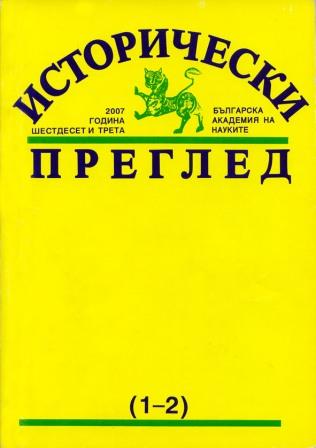Между дипломатическата предпазливост и “дипломацията” на четите: българската външна политика и въоръжената дейност на ВМОРО (От края на Илинденско...
Between Diplomatic Prudence and “Diplomacy” of the Insurrection Bands: Bulgarian Foreign Policy and the Armed Activity of the Internal Macedonian-...
Author(s): Slavi Mitkov SlavovSubject(s): History
Published by: Институт за исторически изследвания - Българска академия на науките
Summary/Abstract: Between Diplomatic Prudence and “Diplomacy” of the Insurrection Bands: Bulgarian Foreign Policy and the Armed Activity of the Internal Macedonian-Adrianople Revolutionary Organization (End of Ilinden-Preobrajenie Insurrection up to the Young Turk’s Revolution) / The suppression of the Ilinden-Preobrajenie Uprising in the summer of 1903 placed the Bulgarian government in an extremely delicate situation not only in terms of foreign policy, but with respect to the Macedonian-Adrianople movement too. The situation after the uprising raised a number of problems, related to the practical relationship between the government institutions and the Macedonian-Adrianople revolutionary organization. On the key issue - should the revolutionary movement in European Turkey be materially maintained, there outlined were two contrasting concepts. According to the first . any crossing of armed formations from the Principality would be harmful for the Bulgarian state and national interests, and according to the second, the actions of the armed bands would be appropriate, because they demonstrate to the outside world the Bulgarian population striving for freedom. The forced adaptation of the two contrary concepts - that of the armed bands (it was maintained mostly by the Ministry of Foreign Affairs) and the anti-armed bands one (maintained by the diplomatic representatives in Turkey), undoubtedly created many difficulties and added volatility to the official Bulgarian policy on the Macedonian issue. The governments in Bulgaria during the period (1903.1908) continued, albeit in balanced proportions, to support the course of the revolutionary bands activities, which was the course taken by the Internal Macedonian-Adrianople revolutionary organization too. For the governments in the Principality this course was not an isolated and separate phenomenon, but rather a way for pressure, that supplemented the diplomatic efforts to deepen the reforms in Macedonia.
Journal: Исторически преглед
- Issue Year: 2010
- Issue No: 1-2
- Page Range: 93-117
- Page Count: 25
- Language: Bulgarian
- Content File-PDF

